September 30, 2010 at 2:35 pm
It is better to be feared than loved, if you cannot be both.
– Niccolo Machiavelli, in Chapter XVII of The Prince.
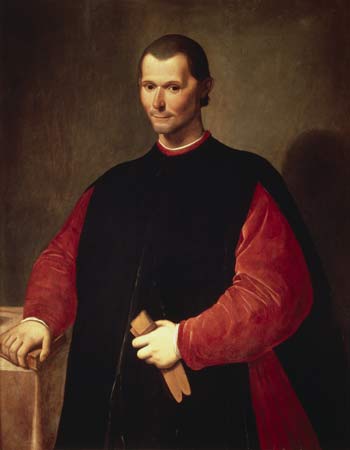
NB: A pundit writing at Politics Daily criticized President Obama by pointing out his failure to adhere to Machiavelli’s advice in being feared and loved. Conclusion: what Machiavelli wrote 500 years ago still has relevance today, demonstrating the continuing value of a Core education!
By CAS Core Curriculum
|
Posted in Analects
|
Tagged Analects, CC203, Machiavelli
|
September 29, 2010 at 2:18 pm
In view of a recent change in our department lounge refreshments policy -- namely, we know set out a bowl of fresh fruit for students and visitors, rather than one filled with toothsome but unhealthy candy -- today's Analect of the Core has to do with food. From David Ferry's version of the epic Gilgamesh, Tablet II, pp. 12-13:
They cooked food and set it down before him;
they brought out beer they had brewed and set it down.
But Enkidu knew nothing about these things,
so he sat and stared at the cooked food and the beer
for a very long time, not knowing what to do.
Then Shamhat, the harlot, the temple prostitute,
said: "Enkidu, this is the food and drink
men eat and drink. Eat and drink your fill."
So Enkidu ate his fill of the cooked food,
and drank the beer. Seven jugs of the beer
and he was suddenly joyful, and sang aloud.
By CAS Core Curriculum
|
Posted in Analects
|
Tagged CC101, David Ferry, Gilgamesh
|
September 29, 2010 at 10:34 am
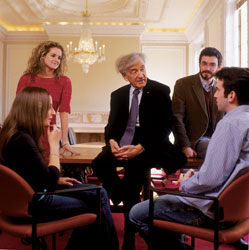
Students in the classroom with Professor Wiesel after a session of his Faith and Power seminar. Photo by Webb Chappell. Source: BU Today
Prof. Elie Wiesel has always played a central role in our fall series of lectures for CC101 students, as a scholar, certainly, but also as a representative of a tradition of conscience and wisdom that we are fortunate to benefit from in our community and our world. As I was listening to him speak once again on Exodus this week, I was reminded of a passage from the end of his Nobel Prize acceptance speech:
There is so much to be done, there is so much that can be done. One person—a Raoul Wallenberg, an Albert Schweitzer, a Martin Luther King Jr.—one person of integrity can make a difference, a difference of life and death. As long as one dissident is in prison, our freedom will not be true. As long as one child is hungry, our life will be filled with anguish and shame. What all these victims need above all is to know that they are not alone; that we are not forgetting them, that when their voices are stifled we shall lend them ours, that while their freedom depends on ours, the quality of our freedom depends on theirs.
This is what I say to that young Jewish boy wondering what I have done with his years. It is in his name that I speak to you and that I express to you my deepest gratitude as one who has emerged from the Kingdom of Night. We know that every moment is a moment of grace, every hour an offering; not to share them would mean to betray them.
Our lives no longer belong to us alone; they belong to all those who need us desperately.
(from Night, published by Farrar, Straus and Giroux, 2006, page 120)
We invite you—students who were in the lecture this week, and alumni who have had the chance to hear Prof. Wiesel in previous semesters—to share your own reflections on his lectures, or his writings, whether here on the Core blog, through discussion on the EnCore Facebook page, or in person with your classmates.
By mdeckel
|
Posted in Core Authors, Great Personalities
|
Tagged CC101, Exodus, Wiesel
|
September 27, 2010 at 10:12 am
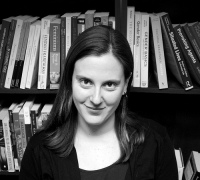 This Wednesday, Prof. Susanne Sreedhar -- Assistant Professor of Philosophy, and frequent lecturer in CC203 -- will be presenting a talk titled "Hobbes and Locke on Toleration" as part of the Fall 2010 lecture series organized by the Boston University Institute for Philosophy & Religion.
This Wednesday, Prof. Susanne Sreedhar -- Assistant Professor of Philosophy, and frequent lecturer in CC203 -- will be presenting a talk titled "Hobbes and Locke on Toleration" as part of the Fall 2010 lecture series organized by the Boston University Institute for Philosophy & Religion.
From the event description:
Prominent in common understandings of the philosophical history of toleration sits a familiar story: the 17th century as battleground, with Locke, the champion of individual rights of conscience and proponent of separation of church and state facing off against the dreaded enemy, Hobbes, whose all-powerful Leviathan leaves no space for dissent - political, religious or otherwise. This familiar tale has a happy ending: the victory of the former over the latter paved the way for modern theories of toleration.
Of course, the victor in this tale has been scrutinized as much as he has been venerated; Locke's theory has received both positive and negative commentary by subsequent readers. Hobbes's views on toleration, on the other hand, have received little attention in the years since. It is as though Hobbes's defeat left him unworthy of criticism rather than subject to it. Most contemporary debates about the nature and limits of toleration - and there are many - begin by assuming what Hobbes explicitly denies: namely, that the state should not impose religion on its people. This paper challenges the contours of the familiar story, reframing the received understanding of Hobbes's position and, thus, disrupting a too-easy telling of his relationship to Locke.
This lecture will take place Wednesday, September 29, 2010 at 5:00pm, in Barristers Hall, first floor of the BU School of Law at 765 Commonwealth Avenue.
*
Prof. Sreedhar is the author of Hobbes on Resistance: Defying the Leviathan, from Cambridge University Press.
By CAS Core Curriculum
|
Posted in Core Lecturers
|
Tagged CC203, Hobbes, IPR, Locke
|
September 24, 2010 at 3:34 pm
A reminder to CC101 students... Prof. Wiesel will give his lecture on Exodus next Monday, September 27th, at 4 PM in the School of Management Auditorium, room 105. This lecture will replace our normal, Tuesday morning lecture.
Although seating for students in CC101 is a priority, all Core students and alumni are welcome to attend as long as seating is available.
*
Click here to see Prof. Elie Wiesel in a movie clip featured in a previous CC101 lecture on Job, and here to see him in a movie clip featured in CC101 lecture on Exodus.
By CAS Core Curriculum
|
Posted in General Announcements
|
Tagged CC101, Exodus, lecture, Wiesel
|
September 24, 2010 at 11:42 am
A prominent feature of the discussion about great books is the predominance of male authors, and of European ones. The Core at BU has since its inception included texts from the Eastern as well as the Western tradition -- the epic of Gilgamesh, the Analects of Lao-Tzu, the Bhagavad-Gita -- in the scope of its study. In this essay for Prospect magazine, Lindsay Johns ("a writer, broadcaster, and 'hip-hop intellectual'") considers the color of the canon:
At its best, the canon elucidates the eternal truths at the heart of the human condition. It addresses our common humanity, irrespective of our melanin quotient. Homer, Virgil, Dante, Chaucer, Shakespeare, Milton, Dickens—all male, all very white and all undeniably very dead. But would anyone be so foolish as to deny their enduring importance? Boethius’ Consolation of Philosophy, Boccacio’s Decameron or Pico’s Oration On The Dignity of Man are as germane to black people as they are to white. There is no apartheid in the philosophical musings of Cicero, no racial segregation in the cosmic grandeur of Dante and no ethnic oppression in the amorous sonnets of Shakespeare. These works can, if given the chance, speak as much to Leroy in Peckham or Shaniqua in the South Bronx as they can to Quentin in the home counties.
The Core Curriculum is sometimes described as a "great books"-style program, although there are many important features of what is done at BU which make this a problematic assessment. Nonetheless, Core students do spend a lot of their time reading texts whose inexhaustibilityhas earned them a place in the "canon." The existence of a canon of great books, let alone its composition, is itself a contentious issue. Who nominates which classics for inclusion? Should the listings of the canon change with the taste of the times, or should certain books retain their "foundational" or "central" status regardless of their contemporary popularity?
A Prospect reader posted the following very salient quote from "The Soul of Black Folk" (1903) by W.E.B. Dubois -- an article, it so happens, which is read in CC204:
I sit with Shakespeare and he winces not. Across the color line I move arm in arm with Balzac and Dumas, where smiling men and welcoming women glide in gilded halls. From out the caves of evening that swing between the strong-limbed earth and the tracery of the stars, I summon Aristotle and Aurelius and what soul I will, and they come all graciously with no scorn nor condescension. So, wed with Truth, I dwell above the Veil. Is this the life you grudge us, O knightly America? Is this the life you long to change into the dull red hideousness of Georgia? Are you so afraid lest peering from this high Pisgah, between Philistine and Amalekite, we sight the Promised Land?
By CAS Core Curriculum
|
Posted in Other Publications
|
September 23, 2010 at 4:16 pm
Over at the Artcyclopedia, edited by John Malyon, a new slideshow has appeared, showcasing versions of 12 paintings by Dutch post-impressionist painter Vincent Van Gogh which have been digitally manipulated to look like photos of three-dimensional models.
In tilt-shift photography, a special lens is used which lends the illusion that a photo is of a miniature model (Artcyclopedia has some stunning examples of the technique). For this Van Gogh gallery, Photoshop was used to simulate the effects of this tift-shift method, by adjusting the contrast, saturation, and depth of focus of some of the artist's most famous paintings. The results can be startling, as in this version of Van Gogh's 1888 painting, "The Painter on His Way to Work":
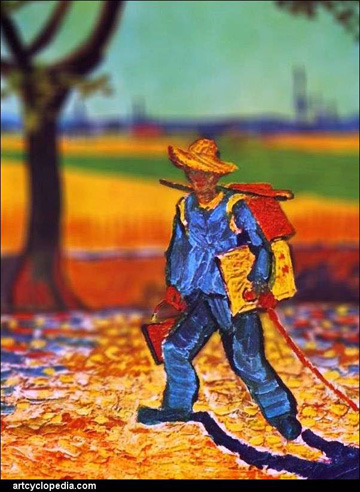
(click here to see the original)
*
Van Gogh's art is studied in the second-year Core Humanities, and often provide Core students with stimulating paper topics. He was, after all, quite an interesting figure; once, he claimed that he wanted to create an image that could make the viewer go mad: his "Night Café" was the result. He lived his life believing himself to be a failure, unaware of the fame he would receive after death.
Annalisa Dias-Mandoly (Core '08, CAS '10), was inspired by Van Gogh's "Starry Night" to write the following poem, which appeared in the Core Journal in Spring 2008:
STARRY NIGHT
Let me live in a cave for all my life.
Shimmering starlight blinds my eyes
And, in agony, I try to turn away,
But everywhere radiance remains.
I would rather be comfortable and safe.
So let me live in a cave and outlast the day.
I accept your shackles with heartfelt thanks.
They take the fault off my back.
Yes, let me keep my back to the world-
Watching shadows dance along in silence,
I will write their stories with my dry wit.
Here again, as always, I and we and
All those sad and sorry ones sleep
Away the light, straining in the night
To see past reflected starbeams.
*
Did you know? There is an entire website devoted to the personal letters Van Gogh sent to his brother Theo.
By CAS Core Curriculum
|
Posted in Art
|
Tagged alumni, artist, CC202, Humanities, painting, poem, Van Gogh
|
September 22, 2010 at 4:40 pm
In her essay for the Spring 2010 issue of the Core Journal, Fabiana Cabral explicates Emily Dickinson's poem, "It Sifts from Leaden Sieves," in which--Cabral argues--Dickinson is declaring man's mortality as a kind of freedom:
The Sun and the Moon have no choice in their existence. As eternal figures, they must remain in the sky until God sees fit to knock them down. But the snow, although doomed to melt and to cease to exist in its current state, is not fixed, and thus it is free.
The snow, like Man, can separate and condense at will; likewise, an individual can isolate itself and join others at will. What remains constant is its choice. Man and snow are the "figures" suspended in the "baseless Arc." Yes, they are at the mercy of the juggler, and yet for that brief moment that they are "situated" in the air they stand alone, "baseless" and free: they manage to stand even though they are unsupported by eternity. Their transience allows them to do this, much like a juggler's balls cannot remain standing alone in the air for long, but only for an instant. [from "The Twining of Volition with Transience in Dickinson's Conception of Man," published in Creó, the journal of the Arts & Sciences Core Curriculum, No. 19]
The journal committee will convene early in Fall 2010 to assemble an editorial team for the 20th issue. Keep an eye for notice, if you'd like to be involved!
By CAS Core Curriculum
|
Posted in Core Journal
|
Tagged alumni, Core Journal, Dickinson, poetry
|
September 22, 2010 at 1:15 pm
The secret thoughts of a man run over all things, holy, profane, clean, obscene, grave, and light, without shame or blame.
-- Thomas Hobbes, Leviathan.
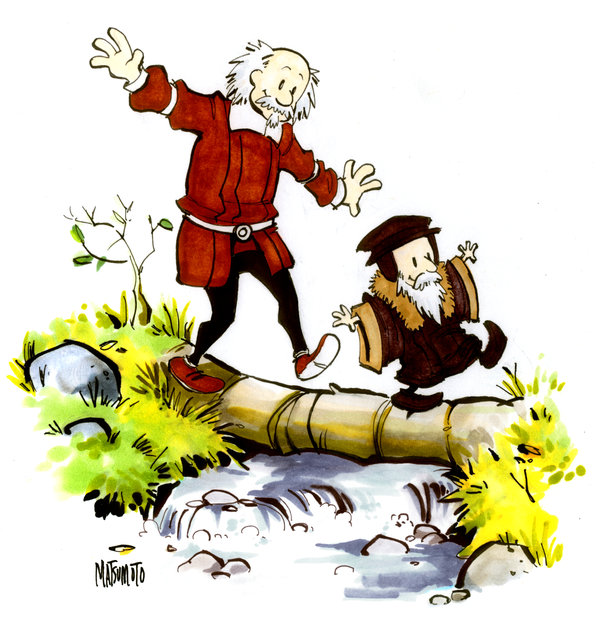
- "Few historians know of the heartwarming friendship between French Reformation theologian John Calvin and English political philosopher Thomas Hobbes, the latter of whom may or may not have been real, considering he was not even born yet." -- SpaceCowboy, at DeviantArt
*
Tomorrow's CC203 lecture on Hobbes is being delivered by Prof. Richard Tuck of Harvard University. A brief guide to Hobbes with a list of his works appears at the Stanford Encyclopedia of Philosophy.
By CAS Core Curriculum
|
Posted in Analects
|
Tagged Analects, cartoon, CC203, Hobbes
|
September 22, 2010 at 11:48 am
Students, be informed: FREE tickets to the Boston Symphony Orchestra are available by using the BSO College Card. Core students have the special privilege to retrieve a free BSO College Card from the Core office without any additional hassle... so drop by the office whenever you have the chance.
The BSO College Card is valid for the entire school year (expires May 8, 2011), so even if you don't think you'll use it, it's still a good idea to get one just in case. But you really ought to take advantage of this opportunity to experience the Boston Symphony Orchestra (for free!).
Go to bso.org/collegecard to see College Card black-out dates and up-to-the-moment ticket availability. If you'd like, you can even register your card for text/email notifications and special offers. Tickets may be picked up at the BSO Box Office at Symphony Hall (301 Mass. Ave). One ticket will be given per BSO College Card with a valid student I.D.
For more information, call 1-888-266-1200 or visit Twitter.com/bostonsymphony.
By CAS Core Curriculum
|
Posted in Uncategorized
|


 This Wednesday, Prof.
This Wednesday, Prof. 

